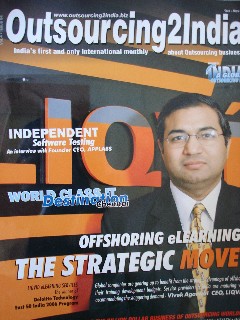President A.P.J. Abdul Kalam, one of the finest examples of Indian leadership, has vouched for e-learning. His recognition of e-learning is not just timely but a trendsetter of sorts given the fact that the Indian government has been extremely slow in accepting e-learning as a way to solve the issues of literacy in India.
What Kalam states makes perfect sense to educationists and researchers. The mammoth task of educating a ever-increasing mass of illiterates can only be realized through Internet technologies and applications. Its time government in Indian states look beyond the parochial five-year politics and plan education for a much longer time-frame. The education ministers in each state should undergo a complete training workshop under our brilliant President so that they are able to appreciate the wider benefits technologies like the Internet. If these education ministers cannot ready themselves for a change then its best for them to forego their charge from the ministry.
Tuesday, December 26, 2006
Tuesday, December 19, 2006
Free Online University: Another revolution round the corner!!
 Having given a run for their money to dubious content sellers Wikipedia is readying to launch another power-laced product -- a Free Online University. True to its democratic nature Wikipedia University will enable anyone and everyone to host e-learning courses or collaboratively develop learning materials. Currently the University is seeking assistance from netizens for a host of areas and its worth being a part of this great initiative.
Having given a run for their money to dubious content sellers Wikipedia is readying to launch another power-laced product -- a Free Online University. True to its democratic nature Wikipedia University will enable anyone and everyone to host e-learning courses or collaboratively develop learning materials. Currently the University is seeking assistance from netizens for a host of areas and its worth being a part of this great initiative. Though the reaction to this initiative from the global e-learning industry is not apparently noticeable, its definately sending jitters down the spine of most e-learning companies in India -- ones that are surviving on the edge. While its obviously a thing to rejoice for the global community as education sheds its boundaries and reaches out to the underpriviledged, its definately a death kneel for the e-learning service industry.
Wednesday, December 13, 2006
E-learning to replace teachers?
Redefining e-learning rules appears interesting. What it actually achieves is perhaps a different story. In Vietnam the National University has announced that it is going to arrest the paucity of teachers through e-learning. The vice director of National University believes that e-learning can enable the university educationh system in the country to produce 20,000 doctors and 1.8 million graduates.
E-learning surely will help Vietam meet its paucity of teachers and facilities but what concerns me is the way e-learning will replace the need of teachers for medical education. As far as my knowledge goes you cannot replace medical teachers with e-learning. If it were possible we would have witnessed a new breed of medics around the world -- e-doctors.
E-learning surely will help Vietam meet its paucity of teachers and facilities but what concerns me is the way e-learning will replace the need of teachers for medical education. As far as my knowledge goes you cannot replace medical teachers with e-learning. If it were possible we would have witnessed a new breed of medics around the world -- e-doctors.
Monday, December 11, 2006
Aptech off to Malaysia
 Aptech has finally decided to wrap up in India and head for Malaysia. Aptech's CEO Pramod Khera cites that since cost of skilled workers in India had risen sharply Malaysia is a more attractive destination because of its good manpower and infrastructure facilities.
Aptech has finally decided to wrap up in India and head for Malaysia. Aptech's CEO Pramod Khera cites that since cost of skilled workers in India had risen sharply Malaysia is a more attractive destination because of its good manpower and infrastructure facilities.By 'good' Pramod meant 'cheap'. With Aptech now heading to cheaper destinations the day, it seems, is not far when other companies will quickly follow suit. Wonder, should we say that the death-kneel of Indian e-learning has been struck?
Progressive Disclosure through Ajax
The mechanism of information disclosure is central to effective learning. Earlier developers used multiple pages to progressively disclose information. Today the same can be done with Ajax code and definately this can result in an improved user experience since all requested information can be found on the same page. Ajax can now enable users to seek more power, better features and ample options, as well as, experience learning with much simplicity.
Its time the Indian e-learning industry starts using Ajax coding.
Its time the Indian e-learning industry starts using Ajax coding.
Friday, December 08, 2006
Is Reliance Competent to handle E-learning?
Though its good news that e-learning is gaining ground in India the concern remains that the niche domain may soon loose its edge with e-learning becoming more of a fancy business decision than anything else. The latest news that Reliance will provide e-learning through its Webworld network is a concern for the industry.
Though its is not exactly clear how Reliance plans to weave out the content for these courses there is a feeling that Reliance will have to rope in some stable and established e-learning players rather than go on its own. If it doesn't the concept is surely not going to be a long-term thing. This considering Reliance's track record of not delivering what they promise, as has been witnessed in the case of its telephone services.
Though its is not exactly clear how Reliance plans to weave out the content for these courses there is a feeling that Reliance will have to rope in some stable and established e-learning players rather than go on its own. If it doesn't the concept is surely not going to be a long-term thing. This considering Reliance's track record of not delivering what they promise, as has been witnessed in the case of its telephone services.
Thursday, December 07, 2006
Liqvid eLearning is an acclaimed leader
 Leadership cannot be propagated through tall claims, it has to show up in action. So truly proved by Liqvid eLearning. With a stupendous growth of 450% Liqvid e-learning has been ranked 8th amongst the among the 50 fastest growing companies in India at the ‘Deloitte Technology Fast 50 India 2006’ award. At the same time, LIQVID has also been selected in the `Deloitte Technology Fast 500 Asia Pacific program'. The ranking is an international recognition for a true leader that has so far silently carved a niche for itself in the e-learning industry -- setting new quality benchmarks for others to follow.
Leadership cannot be propagated through tall claims, it has to show up in action. So truly proved by Liqvid eLearning. With a stupendous growth of 450% Liqvid e-learning has been ranked 8th amongst the among the 50 fastest growing companies in India at the ‘Deloitte Technology Fast 50 India 2006’ award. At the same time, LIQVID has also been selected in the `Deloitte Technology Fast 500 Asia Pacific program'. The ranking is an international recognition for a true leader that has so far silently carved a niche for itself in the e-learning industry -- setting new quality benchmarks for others to follow. Just about a month back I predicted that Liqvid is an e-learning leader in the making, even while indutry honchos laughed away my claim saying that it was too naive and immatured. Quite upto my expectations of their understanding of e-learning, they suggested that I could have made a better journalist if I would have said so about NIIT or their ilk. They talked of financials and several such sundry nuances. I remained unaffected by their affectations.
I always beleived that the best way to gauge leadership is not to look at financials but more at the base-level resources, at the actual resources that does the work. To me Liqvid offered a more vibrant work culture and matured professionalism -- bereft of willy-nilly mindless politics. The micro-level planning at work was meticulous, a quality that I fely was inherent only in leaders.
Today Liqvid's achievement is a personal gain for me, largely because it has enabled me to sustain my argument that leadership in the knowledge economy era is not the realm of the ones who hijack public opinion through glossy ads and publicity -- real leadership can be witnessed in unconventional places amongst unconventional professionals. I only hope that the so-called claimants to leadership in e-learning in India will revisit their system and learn to set their basics correctly. Its time e-learning professionals refute the arguments of the so-called stalwarts in the industry whose credentials, I feel, are as doubtful as their opinions.
Subscribe to:
Comments (Atom)